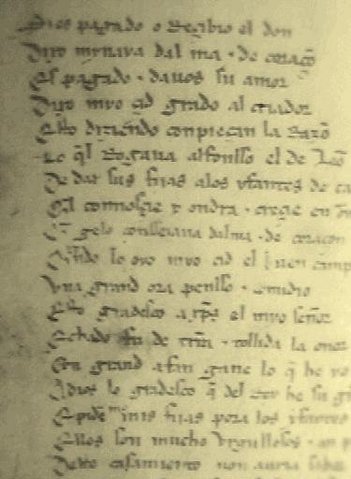Photo taken by User:Chameleon in Valencia (where else?), Aug 2004, of a print of the original codex known conventionally as the Lay of the Cid, Poema del Cid or Cantar de Mio Cid, held at the Biblioteca nacional de Madrid.
| Line |
Transcription |
Translation |
| 1922 |
Si es pagado o reçibio el don |
‘Is he satisfied and did he receive the tribute?’ |
| 1923 |
Dixo mynaya dal ma e de coraçõ |
With all his heart and soul, Minaya said: |
| 1924 |
Es pagado, e davos su amor |
‘He is satisfied, and he gives you his favour’ |
| 1925 |
Dixo mio çid grado al criador |
The Cid said ‘Thank the Lord!’ |
| 1926 |
Esto diziendo conpieçan la Razõ |
After this, the men began declaring |
| 1927 |
Lo q̃l Rogava Alfonsso el de Leõ |
What King Alfonso of Leon was requesting of him: |
| 1928 |
De dar sus fijas alos yfantes de carrion |
That he was to give his daughters away to the Princes of Carrión |
| 1929 |
Q̃l connosçie y ondra e creçrie en õnor, |
Which he knew would raise him in honour and ranking |
| 1930 |
Qẽ gelo consseiava dalma e de coraçon. |
Which he was urging him to accept with all his heart and soul. |
| 1931 |
Qãdo lo oyo myo cid el buen campeador, |
When the Cid, the good champion, heard this, |
| 1932 |
Vna grand ora pensso e comidio |
He thought and meditated for a long while. |
| 1933 |
Esto gradesco a Cristus el myo Señor. |
‘I thank my Lord Christ for this; |
| 1934 |
Echado fu de tier̃a, tollida la onor, |
‘I was exiled and lost all I owned; |
| 1935 |
con grand afan gane lo q̃ he yo; |
‘With keen effort I gained what I now have; |
| 1936 |
Adios lo gradesco q̃ del Rey he su amor |
‘I thank God that the King gives me his favour, |
| 1937 |
E pidẽme mis fijas pora los yfantes de carriõ |
‘And asks for my daughters' hands for the Princes of Carrión. |
| 1938 |
Ellos son mucho vrgullosos e an part en la cort |
‘They are proud, and powerful at Court; |
| 1939 |
Deste casamiento non auria sabor |
‘I would be against this wedding, |
| 1940 |
Mas pues lo conseia el q̃ mas vale q̃ nos |
‘But since it is the will of he who is greater than we |
The original codex was written by Per Abbat in AD 1207, transcribing the work of an anonymous singer who may have composed it over a century before. This work is already in the public domain.
The photo, transcription and translation are the work of User:Chamaeleon, who releases it into the public domain.

